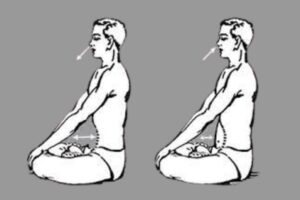||Vrittayah pancatayah klishta aklishta||5||
The meaning of the Sanskrit words being
vrittayah = modifications of mind;
pancatayah = five fold;
klishta = little hard, difficult, painful;
aklishta = not painful
The English meaning of the sloka is-
A Modification of mind is fivefold and they are either painful or not painful. Modification of mind is called a vritti. When one sees through the eyes, though it appears the vision is the act of the eyes, it actually is a result of a manifestation of ones own mind. Modification of mind is behind the sight seen by the eyes. The perception, which is usually through the eyes, actually produces a vision that is two fold. Each perception produces two states. Not painful or otherwise pleasant and painful or unpleasant.
MandukyaUpanishad says “The whole world seems to be nothing but one of the forms of mental modifications of a supreme consciousness.” Modification of mind could be every kind of thought, every field of awareness, every dimension of knowledge, worry, doubt, illusion, mistakes in thinking, anxiety, anger, grief, jealousy, compassion, love and so on. The entire cosmos could be an expression of mental thinking. So Vritti means different personalities of the mind. Just as an actor adorns different roles on stage, so does our mind manifests in the form of waking, dreaming, sleeping, thinking, liking or disliking. One consciousness playing different roles and these are the different vrittis.
||Pramāṇa viparyaya vikalpa nidrā smṛtayaḥ||6||
English Translation: (These are) right knowledge, indiscrimination, verbal delusion, sleep and memory
Sanskrit meaning:
pramana = right knowledge;
viparyayah = wrong knowledge,
vikalpah = imagination, fancy
nidra = deep sleep;
smritayah = memory.
Mind manifests itself in different ways. Each outcome of the mind is given a name. Each modification constitutes consciousness of mind and Patanjali says there are five such modifications. All that is seen, heard and experienced through mind and senses is classified into five groups: right knowledge, wrong knowledge, imagination, sleep and memory. Every mental state is included in these five modifications.
Final aim of Yoga is to destroy anything that is of the nature of mind and coming to an understanding of ‘what is’ is a step towards transcending it. This 6th sutra thus explains as to what the process of practice of yoga should be oriented to, in order to be on the path of refining process. The next sutra that throws light on the sources of right knowledge.
||Pratyaksha anumana agamah pramanani||7||
Let us look through the 7th sutra.
English Translation: Direct cognition, inference and testimony are the sources of knowledge.
Meaning of the Sanskrit words:
pratyaksha = direct cognition, sense evidence;
anumana = inference;
agamah = testimony,
pramanani = sources of right knowledge.
Right knowledge is the manifestation of mind. But the mind can manifest on the wrong side too. Patanjali explains during this sutra the three sources through which right knowledge can be gained.
Sense evidence, inference and testimony- pratyaksha, Anumana and agama. Pratyaksha is experience through our sense organs. If none of them are defective, then the sense evidence could be the source of right knowledge. But still there is the danger of our sense organs creating an illusion like a snake for a rope or mirage in a desert and so on. Anumana or inference is based on sound reasoning. Inference has basis in experience. This is more authentic to Pratyaksha. Two events are necessary to reach an inference. Such inference based on experience that has seldom failed us, can lead to inference of presence of either of them whenever the other is seen. Similar to knowing of the presence of fire far away, when a smoke is sighted. Agama is Sanskrit to testimony. Testimony becomes the source of right knowledge in the absence of both sense evidence and experience. The person whose testimony is to be taken has to fulfil two conditions. One is having right knowledge himself and having ability to impart that knowledge without any mistake. When the testimony giver fulfils these two conditions, such agama can be taken as right knowledge. Scriptures that are not amenable to either sense evidence or inference and Guru, who knows the correct, are Agamas.
||Viparyayah mithya jnanam atad rupa pratistham||8||
English Translation: Indiscrimination is false knowledge not established in real nature.
Meaning of the Sanskrit words:
viparyayah = misconception;
mithya = false, illusory;
jnanam =knowledge;
atad = not its own,
rupa = form,
pratistham = based on
Last week we understood the sources of right knowledge, this week we discuss on source of wrong knowledge. This sutra tells about misconceptions being the source of false knowledge. Misconception is not based on the real object. It is opposite to right knowledge. Right knowledge should have a basis of real object and our knowledge should be based on it. In misconception there is no real object on which knowledge may be based. It is mistaking one thing for another. It is Indiscrimination. Such misconceptions can be and should be corrected by creating conditions that lead to existence of real objects before us.
Knowledge based on misunderstanding is wrong knowledge. Patanjali emphasises that through practice of yoga; we should gain ability to train ourselves in getting correct understanding on issues, objects and so on. Avidya should be replaced by Viveka.
||Shabda jnana anupati vastu shunyah vikalpah||9||
English meaning of the verse: Verbal delusion follows from words have no (corresponding) reality.
English meaning of Sanskrit terms:
shabda = word, sound,
jnana = cognition;
anupati = following upon;
vastu = object,
shunyah = empty;
vikalpah = imagination, fancy.
This sutra discusses another modification of our mind called Vikalpah – which means coming to conclusions based on imagination or fancy. A modification, the mind due to non-training has developed because it has not been trained in restraint. Vikalpa is an unfounded belief. It is knowledge gained through words that have “no object”. It is seeking of an imaginary goal or conscious daydreaming. Beginners are encouraged to imagine certain objects and qualities to help them in their initial states of reaching the state of concentration. But Patanjali warns that it has to be discarded at a stage when the practitioner is able to reach deeper into the state of concentration without their help. Because according to Patanjali, it is in essence a dull state of mind and must be overcome through right knowledge. After studying these 9 sutras we come to the conclusion that Right knowledge, wrong knowledge and imagination are all modifications of our mind. Right knowledge has a true object, wrong knowledge has a false object and imagination has no object at all.
||Abhava pratyaya alambana vritti nidra||10||
English meaning: Sleep is a modification of mind (vritti) that embraces the feeling of void-ness.
English meaning of Sanskrit Terms: abhaava = absence; pratyaya = content of mind; alambana = support, vritti = modifications, nidra = deep sleep
Sleep is said to be an important state of mind. Sleep conceals the knowledge of the external world. But sleep has to be understood the way Patanjali expects of us here. To understand the state of sleep, we can take the help of Mandukya updanishad that describes Sleep as a state where one does not desire anything, nor dream or have any other perception. It is an unconscious state of mind. A state where faculty of perception, which is extraverted when, awake is introverted while asleep. Outer objects are neither visible nor heard. Also there is no feeling. During sleep all modifications of the mind are concentrated together and the energy is fused into one. Every form of knowledge and every modification of mind become silent. Sleep is a state where content of mind is absent. Content of mind in Sanskrit means pratyaya. Pratyaya is mental experience of an object with or with using of sense organs. When we say the content of mind is absent, psychologically this means that the brain and the mind are disconnected and thoughts are suppressed temporarily. Even if thoughts are present, they are not present before the mind for it to see, touch, think, hear, feel or have a mental experience. You might think that this is the state of Samadhi has been explained time and again. This is why it is of utmost importance to analyze the sleep condition of the mind for it is comparable with the state of Samadhi.
||Anubhuta vishaya asampramoshah smritih||11||
English meaning: Not letting the experienced objects escape from the mind is memory.
English meaning of Sanskrit words:
anubhuta = experienced; vishaya = objects of perception; asampramoshah = not letting escape; smritih = memory.
This sutra talks of memory. This is the last spelt vritti of our mind. Memory is asampramosha: a-no, sam-completely, pra-high or great, mosha-releasing, escape. It literally means ‘not allowing to escape’. When we do not allow our experience to escape from the mind, it becomes memory. So memory is recalling of past experiences. Sense organs bring about the experiences. If we let go of the experience, no memory is formed. If we do not let go of the experience, we have the memory. There are two kinds of memory- Conscious memory and subconscious memory and again memory can be real or imaginary. Just as we can build our memory based on facts so can we built a memory based on imagination or fancy. Dream is another face of memory. We can dream of what we really experienced, a factual dream or we can have a dream involving imagination. Patanjali calls for blocking or stopping all these modifications of our mind. So far Patanjali has explained that there are five modifications in our mind.
Tags: Yoga Teacher Training in India – 200 Hour Yoga Teacher Training in India – 300 Hour Yoga Teacher Training in India – 500 Hour Yoga Teacher Training in India – Online Yoga Teacher Training




